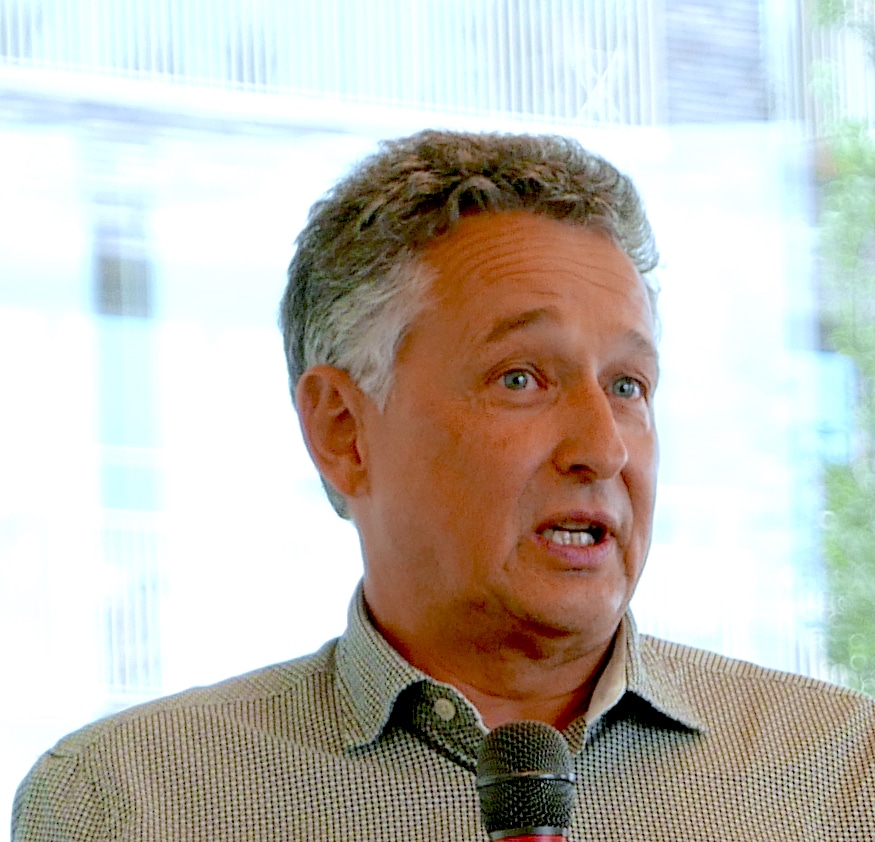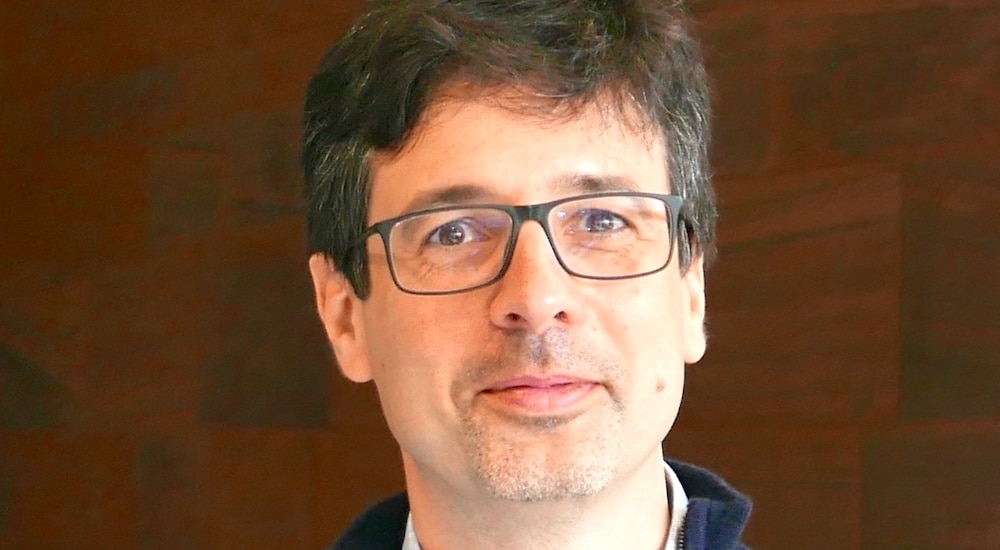DEMENTIA - THE WIN-WIN RESEARCH FOR AUDIOLOGY
Audiology News UK interviews psychiatrist Dr. Sergi Costafreda, one of the academics aiming to harvest a more certain understanding on the link between hearing loss and cognitive decline.

Of all the health conditions currently in the crosshairs of hearing-related research, dementia is arguably the most wretched and frightening. Any terminal illness is bad enough, but the gradual cognitive shredding away of what gives us identity, orientation, a dialogue with the soul and other souls is truly, as psychiatrist Dr. Sergi Costafreda Gonzalez points out, a “devastating” condition.
And if hearing loss has any role in the development of dementia, then we have to find out what that role is and how its influence can be managed.
PW Dr. Costafreda revealing outcomes from his research last at the autumn 2022 conference of the British Academy of Audiology.
8% – a number worth working with
Dr. Costafreda, Associate Professor in Mental Health of Older Adults at University College London’ Division of Psychiatry, was a few minutes fresh from delivering the Adrian Davis Lecture at the British Academy of Audiology’s2022 Conference when he shared his thoughts with Audiology News UK.
And those thoughts on the subject of dementia and hearing loss are now firmly structured around the evidence he and fellow researchers have gleaned from over five years of work that shows that “we know something that we didn’t know before: you can treat hearing loss in people with memory problems, and I don’t think anyone looking at our data will say it’s not clear; it is clear, it’s from a trial, it’s clear!”
Many people will want such confident assertions to be backed by a number from which outcomes can be assumed. And the number Costafreda emerges with from his team’s trials is eight percent – 8%.
“If you could cure hearing loss, absolutely the data indicates that that would reduce the prevalence of dementia by eight percent. So hearing loss, from the data we have, is responsible for up to eight percent of the cases of dementia” he says.
“So if it is causal – it looks like it is – then if we could improve hearing then there would be less dementia, and that’s very very important” Costafreda underlines.
The strong association between untreated hearing loss and dementia
Despite the results of many recent epidemiologic studies showing an association between peripheral hearing loss and cognitive decline/ incident dementia in older adults, no one should forget how meandrous the research process can be. Dr. Costafreda underlines that there is now a lot of observational data on “people who have hearing loss, people who don’t have hearing loss, people who have hearing loss and then get hearing aids”, and this is evidence of a “strong association” between untreated hearing loss and dementia, “at least as strong as other risk factors that people know more about, like hypertension or diabetes”.
But finding the evidence that can translate into concrete “proof” audiologists can use in different ways in their work is a process currently ongoing.
“Just observing people does not give us a final definitive answer because reality is very complex, and all these things are related to age, so you cannot be 100% sure unless you do an experiment where, under as controlled conditions as possible, you modify or treat some people with hearing aids, or you treat some people’s hearing loss in the manner that is most appropriate, and in most people it’s going to be hearing aids” Costafreda stresses.
“If you introduce the element of randomisation, so there is equivalence on that, then at the end of that you know if there is a benefit of treating hearing loss. If you find that there is a benefit of treating hearing loss in cognition, in mood, in quality of life, and so on, then you can say it’s because you treated the hearing loss” he adds.
And the quality of the research is also a key factor. “There is no point in producing more low quality research that is not going to answer the questions and you are going to think maybe it’s this, maybe it’s that; there is a lot of that.”
The ACHIEVE trial
Hearing loss/dementia studies are taking place all over the world. Of late, eyes have very much followed one particular investigation of hypothesised mechanistic pathways underlying the aforementioned association. In the hands of Frank Lin et al, the Aging, Cognition, and Hearing Evaluation in Elders (ACHIEVE) randomised trial is following some 900 70-84 year-old cognitively-normal older adults with hearing loss. The trial method involves hearing needs assessment, fitting of hearing devices, education/counseling, and control intervention. It is powered to detect a minimum of a 0.30 standard deviation (SD) difference in the annual rate of cognitive decline between the hearing intervention and the successful aging intervention study arms over a 3-year follow-up period.
Dr. Costafreda and his team are obviously watching this ACHIEVE trial with great interest. “Essentially, it’s a trial that is active, that is public knowledge, and it has been going on for a few years and it’s going to answer some of the questions in people that are older, but that don’t have necessarily memory difficulties” explains the UCL expert, before highlighting the key difference between ACHIEVE and his own investigation: “The trial that we want to dois in people who are at high risk of developing dementia, who are the people with mild cognitive impairment.”
While the results from the US trial can be expected in the relatively near future, the planned UCL study needs funding approval. “I think the importance of the trial we’ve done so far is that it lays the ground to show that we can conduct a big trial so we can get a really high quality from a scientific point of view – answer to the question. So I’m quite confident that we will run the trial: we have a good case,” affirms Costafreda.
To obtain concrete evidence, trials are undoubtedly required. The need for knowledge is compounded by the benefit yield from such knowledge. “If you want to be able to say that we should definitely prioritise hearing because it is likely to lead to a lot of benefit to the population – which I think is very likely – you need trials so that people can figure out not just if it benefits but how much and how do we do it right,’ argues Costafreda.
The social benefits of hearing
The importance of treating hearing to better brain health has become a priority focus for this psychiatrist now so engaged in pursuing the social benefits of good hearing.
“We are social animals. Hearing is crucial for social interaction because hearing loss in older people tends to be insidious; it creeps on you” he explains.
“Loss of hearing somehow gets normalised by the person themselves, and you know they just turn the telly on, they stop going to places that might be noisy, like the pub, the church sometimes, where you can meet other people. They isolate themselves, and I think that is likely to have, and we have good evidence of this, very bad consequences for you in the long run” Costafreda states.
And for Dr. Costafreda, the social aspects of hearing, the uses we make of hearing that foment and maintain social interaction, are key, even more so than auditory training and exercises that we can engage in, though he admits that “doing things that are pleasurable through your hearing, going to nature and listening to the sounds, listening to music and playing it, are absolutely positive as well”
What can hearing care professionals do with the link between hearing loss and cognitive issues? At the end of this rainbow, the pot labelled “professionals” should contain some golden advice on how hearing care also becomes care of patients’ cognitive health.
Preparing this pot is something Costafreda and colleagues have given thought. Their research so far, however, has involved GPs rather than hearing care professionals, and GPs have recently been criticised from various quartersfor their handling of patients with hearing difficulties.
PW Dr. Sergi Costafreda: “Loss of hearing somehow gets normalised by the person themselves, and you know they just turn the telly on, they stop going to places that might be noisy, like the pub, the church sometimes, where you can meet other people.”
So how easy was it involving GPs in research, and hocan HCPs be brought into the equation when research is strong enough to translate into clinical practice? Dr.Costafreda shows some understanding and admits some puzzlement on this difficult question.
“The trial definitely shows that if you want to get people with mild cognitive impairment (MCI) to start using and continue using hearing aids, you are going to need support, and that the usual way that people get hearing treatment doesn’t work in this population” affirms the psychiatrist, underlining that the reasons for this are “complex”.
“I think part of it is that the persons themselves don’t perceive that they have a problem or they think it’s not going to make a big difference if they get treated. So, you could say this is apathy or lack of knowledge from the point of view of the person, lack of understanding or appreciation that there might be benefits of treating hearing.”
Do GPs simply not refer their MCI patients for hearing examinations? Costafreda does not want to say this, “because they do! Even when they refer, the translation to people actually getting the hearing aids and wearing them is not great, so I think there is a breakdown or an opportunity missed at each step on the chain….the patient awareness, the GP, and then at the audiology level.”
Costafreda suspects that GPs need to be more aware of the potential benefits, and that if they were “they might have that conversation with the patient, not just saying ‘oh yeah, well you’re turning up the telly as you get older, this is normal and so on’. They might have a conversation with more you know you should really give a try to treating hearing, it might not be for you, but if it is for you it can make a significant difference to your life.”
So, yeah, I think we have more work to be done in that area” the expert affirms.
PW Prof. Adrian Davis (left) and Dr. Sergi Costafreda met for the first time at the 2022 BAA Annual Conference, the latter invited to give the prestigious Adrian Davis Lecture named in homage to the former.
What stance can hearing care professionals take?
While Costafreda’s team try to make intervention in their studies as other-healthcare-professional-friendly as possible, looking beyond working only with GPs has to be balanced against resources and budgets. This psychiatrist certainly believes “there are lessons in what we did that that could help redesign pathways, particularly for people who have memory difficulties, because the pathways clearly don’t work for them”.
“How we translate that to the clinical practice with the resources that we typically have and so on I’m not so clear. I have some clues. Telling people about links between brain health and hearing, and all the benefits, is super important. People in the study told us ‘well If that’s the case then let me have them, let me try the hearing aids… I don’t think I have a problem, but if you tell me if you tell me that you measure the problem and you tell me that treatment would reduce the risk of me having dementia in the future, then I want to try that having dementia in the future, then I want to try that.’ That made a massive difference!”
The HCP can definitely believe, says Costafreda, that there is a dividend for patients from being told that “if you treat your hearing loss It has positive consequences for your mood for your health, for your cognition, for your memory and so on.”
Source:Audiology News UK issue 01 March/April 2023







